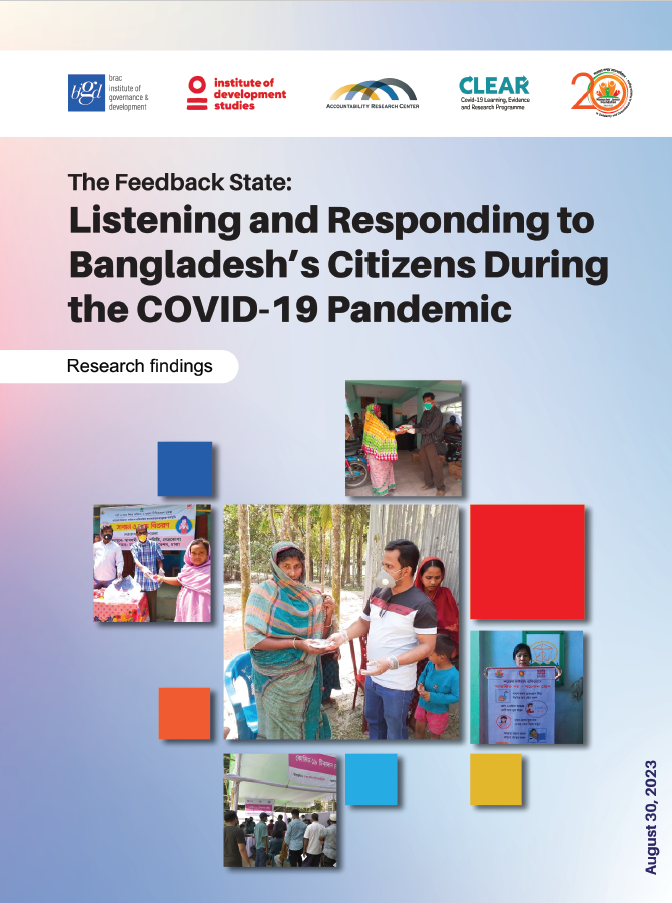
Listening and Responding to Bangladesh's Citizens During the Covid-19 Pandemic
Date: October 2023
Author(s): Zahir Ahmed, Syeda Salina Aziz, Shuvra Chowdhury, Mirza Hassan, Rafsanul Hoque, Naomi Hossain, Pranab Kumar Panday, and Marium Ul-Mutahara
Publication type: Report
Published by: BRAC Institute of Governance and Development and Manusher Jonno Foundation
This report summarizes findings from research designed to assess how and how effectively different levels of the Bangladesh government listened and responded to its citizens during the COVID-19 pandemic, and what was learned about these mechanisms of feedback. The project was motivated by recognition that the health, social, and economic crises sowed by COVID-19 in March 2020 are ongoing and mutating: rapid learning about what is working in pandemic response is particularly urgent in Bangladesh, where inadequate health services and a patchy social safety net left many people vulnerable. This report summarizes key findings from research that asked:
- Which mechanisms were used to gather citizens’ feedback on health and social protection needs during the COVID-19 pandemic – and how successfully?
- How did central government encourage or enable local government to respond?
- What have government actors learned about the value of citizen feedback in the pandemic response?
The research uncovered a generally positive appraisal of official efforts to gather feedback from citizens, also identifying a shift towards a great expectation that the state should be more effective at taking proactive steps to listen and respond to citizens’ perspectives and concerns. In practice, however, people’s trust in formal feedback mechanisms in practice was weaker than their belief in the value of such practices. In the gap between aspiration and reality, individual and social initiatives to enable citizens to be heard and to have their needs responded to were visible.
Evidence suggests that the pandemic also introduced a shift in ways of working and organizational culture within the government, notably towards more online and digital modes of operation. However, the research found that analogue and informal means of communicating concerns and requesting assistance remained the most important means of citizens providing their feedback.
The effectiveness of responses to citizens’ concerns are determined by political priorities and state capacities for effective response. There is a proliferation and fragmentation of platforms for gathering citizen feedback and providing citizens with information which is challenging for both citizens to navigate and for state actors to use.
Recommendations from the research include:
1. Explore the scope for creating a unified system for citizen feedback and response.
2. Strengthen frontline face-to-face systems for receiving and handling feedback.
3. Partner with citizen groups to raise awareness and support participation.
4. Development partners should proactively support the development of citizen feedback and
redress mechanisms.
Zahir Ahmed is Professor of Anthropology, Jahangirnagar University.
Syeda Salina Aziz is Fellow of practice, BRAC Institute of Governance and Development, BRAC University.
Shuvra Chowdhury is Professor of Public Administration, University of Rajshahi.
Mirza Hassan is Senior Research Fellow, BRAC Institute of Governance and Development, BRAC University.
Rafsanul Hoque is Senior Research Associate, BRAC Institute of Governance and Development, BRAC University.
Naomi Hossain is Research Associate, Accountability Research Center, and Professor of Development Studies, SOAS University of London.
Pranab Kumar Panday is Professor of Public Administration, University of Rajshahi.
Marium Ul-Mutahara is Knowledge Management Coordinator, Manusher Jonno Foundation.
